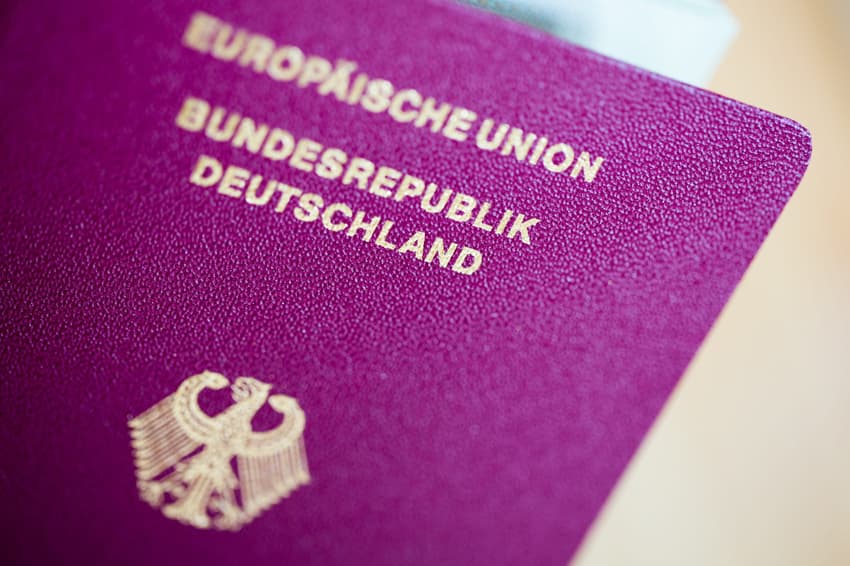Germany sees steep rise in number of foreigners becoming citizens

More than 130,000 foreigners gained German citizenship last year, with a large jump in the number of Syrians becoming naturalised.
In 2021, around 131,600 foreigners were naturalised in Germany, according to figures released by the Federal Statistical Office (Destatis) on Friday - an increase of around 21,700 - or 20 percent - more than in the previous year.
The steep rise is due to the high number of Syrians who gained German citizenship after fleeing war.
In total, around 19,100 Syrian nationals were naturalised - almost three times as many as in 2020.
As well as Syrians, Turkish (12,200), Romanian (6,900), Polish (5,500) and Italian (5,000) nationals were the nationalities who received citizenship most frequently last year.
In total, people with 173 different nationalities were given citizenship in Germany.
Im Jahr 2021 wurden rund 131 600 Ausländerinnen und Ausländer in Deutschland eingebürgert. Das waren rund 20 % mehr als im Vorjahr. Dieser Anstieg ist gut zur Hälfte auf die hohe Zahl an #Einbürgerungen von Syrerinnen und Syrern zurückzuführen. Mehr dazu: https://t.co/ggD5kobE0i pic.twitter.com/308gTB0wTd
— Statistisches Bundesamt (@destatis) June 10, 2022
Every fourth person to gain a German passport last year was an EU member state national. Germany allows EU citizens to have dual citizenship, meaning they can keep their original passport.
However, in most cases, non-EU nationals have to give up their original citizenship to become German, unless there are exceptional circumstances.
Refugees, for example, are entitled to keep their original nationality, as are citizens from countries like Syria and Afghanistan where renouncing your nationality is not permitted.
As The Local has been reporting, the government plans to relax its dual nationality rules, which will make a huge difference to the lives of many foreigners in Germany.
READ ALSO:
- 'Changing German citizenship laws is a priority'
- ‘I finally feel at home’: How Germany’s planned changes to citizenship laws affect foreigners
What's behind the rise in Syrians gaining citizenship?
The high number of naturalisations of Syrians is related to the influx of refugees who fled war and came to Germany in the years 2014 to 2016. Many of those people who came to the country then now fulfil the requirements for naturalisation.
These include sufficient language skills, a secure livelihood and, as a rule, a minimum period of residence of eight years. However, the vast majority (81 percent) of Syrians naturalised in 2021 had not yet lived in Germany for eight years.
But people can get naturalisation earlier under Germany's citizenship rules if they show "special integration achievements". These can include speaking German particularly well as well as community or social achievements.
The average duration of residence in Germany for Syrians who naturalised last year was 6.5 years. The number of naturalisations for this group is expected to rise further in 2022.
Comments
See Also
In 2021, around 131,600 foreigners were naturalised in Germany, according to figures released by the Federal Statistical Office (Destatis) on Friday - an increase of around 21,700 - or 20 percent - more than in the previous year.
The steep rise is due to the high number of Syrians who gained German citizenship after fleeing war.
In total, around 19,100 Syrian nationals were naturalised - almost three times as many as in 2020.
As well as Syrians, Turkish (12,200), Romanian (6,900), Polish (5,500) and Italian (5,000) nationals were the nationalities who received citizenship most frequently last year.
In total, people with 173 different nationalities were given citizenship in Germany.
Im Jahr 2021 wurden rund 131 600 Ausländerinnen und Ausländer in Deutschland eingebürgert. Das waren rund 20 % mehr als im Vorjahr. Dieser Anstieg ist gut zur Hälfte auf die hohe Zahl an #Einbürgerungen von Syrerinnen und Syrern zurückzuführen. Mehr dazu: https://t.co/ggD5kobE0i pic.twitter.com/308gTB0wTd
— Statistisches Bundesamt (@destatis) June 10, 2022
Every fourth person to gain a German passport last year was an EU member state national. Germany allows EU citizens to have dual citizenship, meaning they can keep their original passport.
However, in most cases, non-EU nationals have to give up their original citizenship to become German, unless there are exceptional circumstances.
Refugees, for example, are entitled to keep their original nationality, as are citizens from countries like Syria and Afghanistan where renouncing your nationality is not permitted.
As The Local has been reporting, the government plans to relax its dual nationality rules, which will make a huge difference to the lives of many foreigners in Germany.
READ ALSO:
- 'Changing German citizenship laws is a priority'
- ‘I finally feel at home’: How Germany’s planned changes to citizenship laws affect foreigners
What's behind the rise in Syrians gaining citizenship?
The high number of naturalisations of Syrians is related to the influx of refugees who fled war and came to Germany in the years 2014 to 2016. Many of those people who came to the country then now fulfil the requirements for naturalisation.
These include sufficient language skills, a secure livelihood and, as a rule, a minimum period of residence of eight years. However, the vast majority (81 percent) of Syrians naturalised in 2021 had not yet lived in Germany for eight years.
But people can get naturalisation earlier under Germany's citizenship rules if they show "special integration achievements". These can include speaking German particularly well as well as community or social achievements.
The average duration of residence in Germany for Syrians who naturalised last year was 6.5 years. The number of naturalisations for this group is expected to rise further in 2022.
Join the conversation in our comments section below. Share your own views and experience and if you have a question or suggestion for our journalists then email us at [email protected].
Please keep comments civil, constructive and on topic – and make sure to read our terms of use before getting involved.
Please log in here to leave a comment.